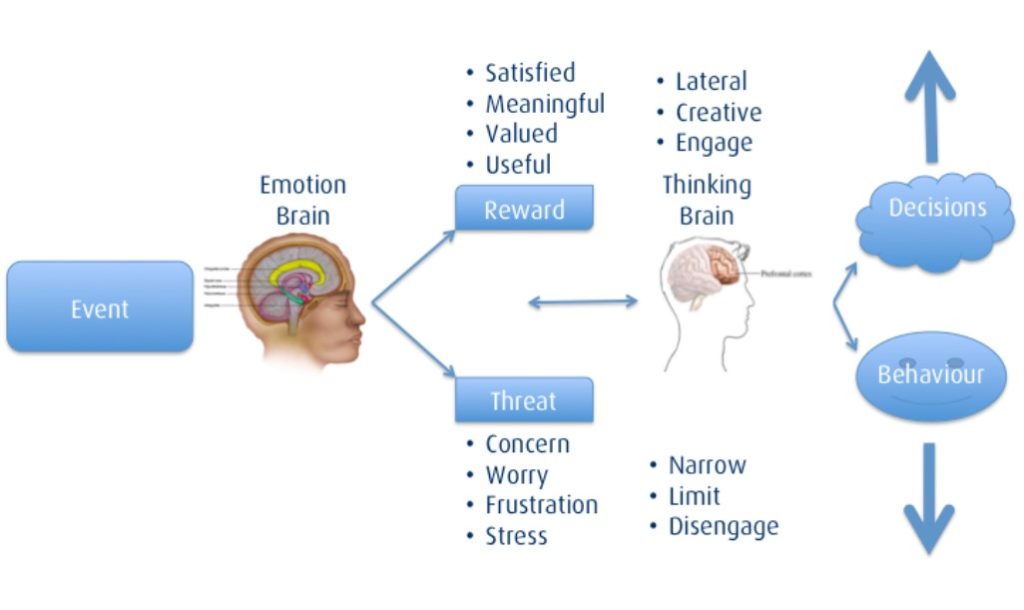Neuroscience, the study of the biological mechanisms of the brain, has shown that whenever an event around us occurs (such as the way someone is talking to us in a meeting), the first thing that happens is our so-called Emotional Brain, that involves structures such as the Amygdala, tags that event as either a Reward or a Threat; or Friend or Foe. The job of the Emotional Brain is to make very quick, unconscious determinations about whether something or someone is safe or not. The tag, which is in fact an emotion, is communicated to the so-called Thinking Brain that involves structures such as the Pre-Frontal Cortex. The pre-frontal cortex is involved in helping us determine good from bad and better from best. It helps us anticipate behaviour and determine the best behavioural response to make to events.

Neuroscience has also shown us that positive emotions tend to enhance the functioning of our prefrontal cortex having a ‘broaden and build’ effect. That is, positive emotions help us think more openly, creatively and laterally. With positive emotions, we tend to be more open to new ideas. We also tend to think more deeply about issues and see more options. Positive emotions also increase dopamine levels that are important for interest in things and learning. Negative emotions conversely limit the functioning of our prefrontal cortex narrowing our thinking and limiting our interpretation of events. Negative emotions tend to diminish our cognitive resources. As a result, we can become biased in our views, lose our capacity to objectively evaluate situations and conceptualise our best responses to them. You may have experienced this in a verbal conflict with someone where you felt threatened and thought about all the best or ‘smartest’ things to say once you’d walked away from it. While the effects of emotions are obvious when we are consciously experiencing them (e.g., we do our best thinking when we feel relaxed and commonly do things we later regret when angry at work), emotions are constantly and powerfully affecting our decisions, behaviour and performance unconsciously as well.
The job of the Emotional Brain is to make very quick, unconscious determinations about whether something or someone is safe or not. This automatic, unconscious decision-making is what psychologist Joseph LeDoux calls our ‘danger detector’. We are in fact, hard-wired to evaluate the world we are in, and make unconscious decisions about events and the people in them, based on what feels safe, likeable, valuable, comfortable, meaningful, just, correct and so on. This process is very important, particularly from a survival point of view (we’ve all heard the axiom, “it’s better to be safe than sorry”, and to a large degree this is true). However, in the modern workplace, it can also cause us to think and behave in ways that hinder our work performance and relationships. Consider for a moment how you can think, behave and interact with others at work when you feel overly stressed or worried about something.

The workshops will provide you with insight into how important it is that you demonstrate emotionally intelligent workplace behaviour. You will also get an insight into how well you currently demonstrate emotionally intelligent workplace behaviour. You will get practical tips on how to obtain additional feedback from others on your emotional intelligence and how to effectively respond to it. You will have insight into feeling less stressed and better equipped to positively influence the decisions, behaviour and performance of those you work with.


